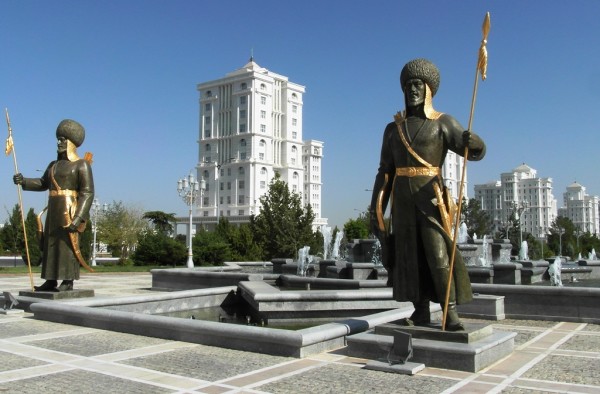
I have never missed watching the Olympics. When I was a kid, I was glued to the TV during the opening ceremonies, trying to count every single country that walked into the stadium. I cheered on Mary Lou Retton and Kerri Strug; Kristi Yamaguchi and Michelle Kwan; Carl Lewis, Greg Louganis, Apolo Ohno and Shani Davis. As technology evolved, I moved from watching everything on TV to following along online in real-time whenever I could.
But in 2012, I missed most of the Summer Olympics while I was on my tour of former Soviet countries. I was in Uzbekistan when they started and then was in Turkmenistan for the rest. In my Uzbekistan guesthouse, only BBC World News provided any coverage, and nothing live at that – just recaps and photos. Given the high level of censorship and lack of internet access in Turkmenistan, I figured my chances of catching any of the games were low.
Luckily, I couldn’t have been more wrong.
My hotels in Mary and Ashgabat both carried a Russian sports station, which provided coverage of the Olympics twenty-four hours a day, likely seven days a week. I only caught three days of coverage, but it was enough for me to realize there were some significant differences from how NBC in the United States tends to cover the Olympic games.
They televised events live.
NBC has been living in the dark ages when it comes to their Olympic coverage by insisting on showing major events on tape delay when today we all can find out the results online. This was a major issue during the Vancouver games as they wouldn’t even stream events live on their website even though the results were all over the internet long before TV coverage started. Russian coverage of the Olympics, though, was primarily live despite a time difference of five hours between London and Turkmenistan. If it was during the hours that action was happening, they were showing it live – whether it was women’s weightlifting, archery, swimming or tennis.
They showed events, period.
I spent an entire day in Ashgabat watching the Russian channel’s Olympic coverage. One thing that really stood out was the high percentage of air time devoted to actually showing athletes in action. No endless studio commentary from so-called experts. No lengthy feel-good athlete profiles. Very limited commercial breaks. It was heaven. I actually got to appreciate the ins and outs of the sports and the pace of some of the events. The latter was especially important as NBC tends to focus on certain athletes without showing how an entire event unfolds, which often removes the suspense and drama from watching.
They covered a lot of non-Russian athletes.
Watching Russian television, I assumed most of the coverage would be tilted toward Russian athletes. While I did catch a women’s basketball game between Russia and Great Britain, most of what I saw was a huge variety. They covered swimming events simply because they are popular events – no Russians were contenders. They showed over an hour of the women’s archery quarterfinals with only one Russian participating. They wisely showed only the second set of Russian Vera Zvonareva getting a beatdown from Serena Williams.
I can clearly remember the last winter Olympics, in which NBC would show one American skier in a downhill skiing event. Then they would cut away to a commercial. Then they would return to show another American skier. And repeat. The focus solely on Americans may have pleased some viewers but I would guess for most sports fans it was incredibly frustrating. It gave you no sense of how the event unfolded, no feeling of suspense or anticipation. And since we usually already knew the results online anyway, it was horribly anticlimactic.
The biggest difference I saw?
The Russian channel that I was watching was a dedicated sports channel even when it wasn’t televising the Olympics and I think that made all the difference. Presumably televising the Olympics is a horribly lucrative deal for NBC since they keep doing it. However, it makes far more sense for a station like ESPN to take over – one that is devoted to sports coverage and generally knows how to do it right. ESPN could take ESPN2, ESPN News and ESPNU and simply run Olympic coverage 24/7 like this Russian sports channel does, while streaming live on ESPN3. When live action is happening, show it live. When action is done for the day or before it starts, show replays of the previous day’s highlights. The key is, show as much action and as many athletes from as many countries as possible. It seems so simple…
I can only hope that someday the American media will follow this model, but I kind of doubt it will happen any time soon.
Note: I wrote most of this post in the summer of 2012 while I was in Turkmenistan, but never published it. From what I’ve seen of NBC’s coverage the first few days of the Sochi Olympics is promising. While much is still on tape delay, I have heard they are at least live streaming online. And I have caught coverage of sports like biathlon and ski jumping in addition to the favorite ice skating and downhill skiing events. On the down side, the tape delayed coverage still includes a lot of jumping around.
